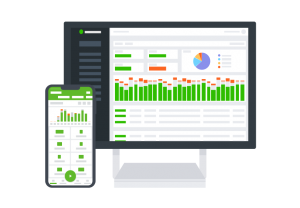How to deal with employee lateness – how to notice the problem and what to do next

You might be the most punctual person in the world, but even you have probably been late for work at least once in your life. Because traffic happens, cars break down, and alarm clocks let us down unexpectedly.
No matter the reason, the question remains – how to deal with employee lateness? When is lateness nothing special and when does it become something to start worrying about? And how to discipline an employee who’s always late for no apparent reason?
We’ll get to the answers to these questions, but first – let’s understand the most common reasons why people arrive late for work.
Want to get the most out of your time?
Try DeskTime for free!
Try free for 14 days · No credit card required.
By signing up, you agree to our terms and privacy policy.

Why are employees late for work?
A survey by CareerBuilder found that 29% of office employees show up late to work at least once a month. Interestingly, the same study found that younger workers (18-34 years old) are late nearly 3x more often than their older colleagues (45+ years old).
But what causes employee tardiness in the first place?
The most common reason, hands down, is traffic. As found in a study by Heathrow Express in 2022, traffic jams cause employee lateness 41% of the time. Other reasons include:
- Public transport delays (29%)
- Unforeseen circumstances (25%)
- Bad weather (18%)
- Oversleeping (14%)
- Forgetting something (12%)
But what about employees who work from home? What are the reasons for their lateness? All the commuting they need to do in the morning is from their bedroom to their desk, so how come they still manage to show up late?

Be smart about your time!
Use DeskTime for time management, and always stay on top of your team’s efficiency ratings.
Oversleeping is a common reason for remote employee lateness. And, unfortunately, quite legit too – remote employees are found to often log in late at night to get done. Logging in before bedtime, however, can worsen one’s night’s sleep and lead to oversleeping in the morning.
Another common reason why remote employees show up late is procrastination. Despite all the benefits of the remote work model, its biggest drawback is the lack of structure and discipline that employees have in an office environment. This leads to employees giving in to distractions, such as home chores, instead of logging in on time for work.
How to notice persistently late employees
As a manager, no matter how much you love punctuality, you have to reconcile with the fact that occasional lateness is inevitable. In the meantime, 16% of office workers admit being late to work at least once a week. Such chronic tardiness is not just annoying but can also affect the team’s morale and cause impact the company’s bottom line.
Now, how do you notice chronically late employees?
The easiest way is to use a time tracking app, such as DeskTime, that automatically logs the time employees arrive to work. This solution works for practically any company and team – large and small, with distributed offices, working in different time zones, with hybrid and remote workplace models, etc.
At the end of the week or month (or whatever period of time you choose), you can take a quick look at your time tracking reports section to see which of your team members have been late and how many times. This allows you quickly identify chronically late employees and take action.
How to handle late employees
So, you’ve noticed that one or some of your employees are regularly late for work – now what? How do you handle such late employees? Here’s your step-by-step plan of action.
Step 1: Make sure it’s not just a short-term thing
The fact that a team member was late several times over one week doesn’t immediately mean that there’s a chronicle lateness problem to solve. Before you jump to any conclusions, take a look at a longer period of time – a month or a year – to see whether this employee has had lateness issues before. Maybe the person is going through some changes and needs some time to get adjusted.
Step 2: Invite your tardy employee for a chat
If showing up late for work happens regularly over a longer period of time, it’s time to take action. Start with inviting the person for a one-on-one chat to let them know you’ve noticed this behavior and make your expectations clear. Hear what the employee has to say, too – what’s the reason for this regular lateness and what you (or the company) could do to help.
Tip: Respect your employees’ privacy – if they don’t want to share why they’re being late, don’t push them.

Step 3: Set goals and outline consequences
Once you’ve heard what the employee has to say regarding one’s regular lateness, agree on a solution and set improvement goals. The reasons for lateness are, of course, different and in some cases, you may need to compromise, eg., allow the person to start their workday later. But if the employee is just bad at managing their time or just not caring about the company’s policies, it’s important to draw a line in the sand and outline the consequences. Both you and the employee should leave the meeting with a clear goal on what improvements are expected and by when.
Step 4: Reward improvements
If you see the employee trying and making positive improvements in their behavior, make sure to let them know that it’s being noticed. Has the always-late employee been on time for an entire week straight? Give them verbal praise or a tap on the shoulder.
Step 5: Consider flexible working hours
The future of work is flexible – and so should be you. You might be a fan of 9-to-5 but fixed work is becoming outdated, as studies show that nowadays employees prefer flexible work schedules. If your business allows it, consider switching to flexible working hours. This might fix work lateness issues for good.
Managing late employees
Chronic attendance problems cost your business a lot of money. Employees who are regularly late for work may also lack motivation, which means lower productivity and – again – lost money.
The first step to effectively dealing with lateness at work is setting up a system, such as time tracking software, to identify which employees are regularly late. This will help you quickly notice the problem and take proactive steps to rectify the situation.
Did you find this article useful? Give it a clap!
Psst! You can clap more than once if you really loved it 🙂